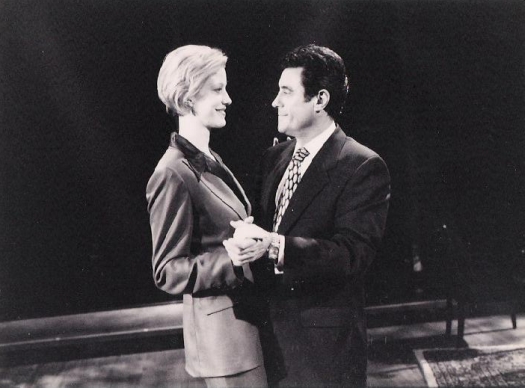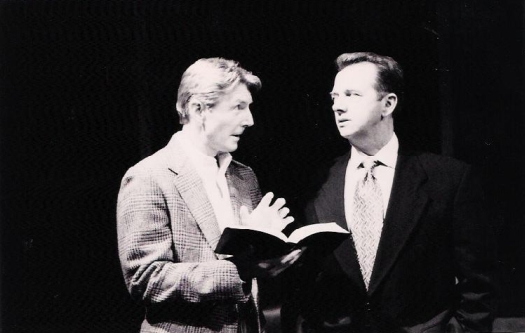REVIEWS:
BackStage West
Reviewed by Rob Kendt
There is rare pleasure to be had
in the Matrix's now-regular double-casting, in which two actors are
assigned each role in each production and then mixed and matched
throughout the show's run in various combinations. With a play as
resonant and troubled as Larry Atlas' Yield of the Long Bond,
this pleasure is especially acute, if problematic. Atlas' bleak love
triangle between a rogue Wall Street investor, a slick young lawyer,
and a down-at-heels Episcopal pastor is so perorative and schematic,
giving each of its three characters more fourth-wall-breaking
speeches than real interaction—more to say to us than to each
other—that it represents a sort of acting triathlon, a three-way
show of dexterity and force. And since Atlas' characters are so
atomized and, in director Andrew J. Robinson's artful, worried
staging, so sharply drawn, it is easy to imagine all six actors
interchanging willy-nilly without much variation in the production's
impact.
That impact is no less harsh for
its seeming, at bottom, profoundly confused. In pitting a sleek,
beautiful young professional woman between a rich vulgarian and a
queasy idealist and making her the battleground (unfortunately quite
literally) for an intensely serious debate on faith, hope, and love,
Atlas risks the canard that he's doing what men, and male writers,
have always done: Looked to women for redemption, even as we deemed
them in need of our rescue.
The young attorney Ellen Kastner
(Julia Campbell, Anna Gunn) is a fallen angel at best, a
squeaky-clean Princeton girl unloosed into the high-powered evil and
low-level spiritual drudgery of big business, where she learns to
play its deadly garae as perfectly as she used to say her prayers.
That game includes getting into bed with such unsavory charmers as
Paul Rosario (Gregory Itzin, Ian McShane), a man with the kind of
terrifying self-assurance that dares a challenge. He meets his match
in Ellen, who at first plays along with his sexual feints and
degradations but soon loses the stomach for them,
suggesting—ostensibly as a practical matter—that he get involved in
charity work to offset the damage of an impending SEC prosecution.
That leads them into the weak
thrall of John Shelly (David Dukes, Byron Jennings), a priest with a
modest think-tank project to promote spiritual values in a soulless
age—which of course leads to Ellen's wavering consideration of these
issues, and in general to the level of windy, contrarian
philosophizing on which Atlas clearly wants to operate. He
introduces an increasingly lurid and incredible plot, and several
new moral wrinkles, into the mix, but even the sudden reversals and
telling observational details are as schematic as a prospectus, his
dialogue often embarrassingly blunt and self-revealing.
How to play this uneasy mix of
monologue, flashback, and confession? Under Robinson's unwavering
gaze, these six actors manage, with varying degrees of passion,
intelligence, and courage, to elevate the work into the rumination
it wants to be. McShane captures Paul's arrogance and steel, Itzin
his rue and sick sense of play; Gunn shows us Ellen's terrible
complicity in her own loss of innocence, while Campbell suggests the
possibly more terrible human fiber that has survived it. Jennings
and Dukes have the most difficult, and most schematic, transition of
the play; while the tender Jennings makes his priest's turnabout
both brutal and pitiful, the edgier Dukes makes it movingly
pathetic, a true human loss.
Deborah Raymond & Dorian
Vernacchio's sparse set, Keith Endo's busy lights, and Peter
Erskine's portentous music are all as deliberate, and as ultimately
haunting, as is the acting, consolidating the Matrix's well-deserved
reputation as one of the boldest and brightest showcases for stage
talent on this coast.

L-R: Anna Gunn & Ian McShane
The Hollywood Reporter
Reviewed by Ed Kaufman
Larry Atlas' "Yield of the Long Bond" has a little of
everything: a bit of humor; a lot of intense philosophizing about the
mysteries of love, the earthly and the spiritual; and a morality tale
about faith vs. greed. And in the second act, the play shifts to a
psychological whodunit and murder mystery that is full of soul-searching,
irony and angst.
Despite using some patches of rhetoric in place of
dramatic writing, Atlas is a first-rate playwright, able to move his
actors with ease and assurance. Credit Andrew J. Robinson's savvy,
free-flowing, expressionistic direction, which keeps things constantly
moving.
"Yield" — having its world-premiere run at the Matrix —
tells the story of Paul Rosario (the thoroughly convincing Gregory Itzin),
a ruthless, arrogant, base, hedonistic, foul-mouthed Manhattan investor
whose net worth is roughly $400 million. When he learns from his
lawyer/lover Ellen Kastner (Julia Campbell) that he is being investigated
by the SEC for insider trading and stock manipulation, she convinces him
change his image and make a large donation to the Parish Project run by
Father Shelley (Byron Jennings). All this for Rosario's respectability
when it comes time for his trial.
Shelley's project wants to "promote thought in a
thoughtless environment"; it includes a newsletter and the commissioning
of a book promoting a spiritual life. Soon Ellen is caught between the the
sacred and the profane worlds.
Writer Atlas has the three square off with one another:
the corrupt and cynical loner Rosario, the once-idealistic Ellen (who seem
fit only for each other) and Shelley, the Episcopalian priest with an
agenda. Seemingly, it's the classic struggle of Good vs. Evil. Only Atlas
has some updated opinions and observations of his own.
Act 1 ends with Ellen's murder, and Act 2 becomes the
whodunit It also includes the unraveling of who the trio is, with all
sorts of twists and turns, the surfacing of old memories and revelations
that are quite effective and really touching.
As always, the Matrix Theatre production features two
casts.

L-R: Byron Jennings & Gregory Itzin
Rave! Magazine
DRAMAS UNVEIL EMOTIONAL WALLOP
By DEBBI K. SWANSON
For the first time since the Matrix Theater in Los
Angeles began single production revivals five years ago, the theater
presents two new contemporary American plays in repertory: "The Water
Children" and "Yield of the Long Bond." Both are double cast.
In Larry Atlas' rather heartless work, "Yield of the
Long Bond," the second of the Matrix plays in repertory, a man of greed
faces off against a man of God. You could say it's a contest of epic
proportions — and the woman in the middle gets soaked.
Using the same set as "The Water Children," Ian McShane is Satan — the soulless Paul Ro-sario, a charismatic, impeccably dressed, morally bankrupt tycoon on the Verge of being financially
bankrupt as well.
Byron Jennings is the voice of God as John, a humble
pastor in corduroy with his own repressed issues. Anna Gunn is the trapped
Ellen, a high-powered attorney in excessively expensive and sexy suits who
has no life except to be at Rosario's beck and call.
She's lost because she's denied her own feelings for so
long in the attempt to bill those all-important hours. She's become a
victim in a nasty game.
The language of this play is fast and furious, Rosario
spewing out financial terms like they were his first language. And as a
boy wonder with stocks, they nearly were.
Under Andrew J. Robinson's direction, the first act is
witty, sharp, funny and cold. At the opening of Act Two, we find the men
in jail, unsure which of them is the inmate. The story becomes Ellen's,
focusing on her emptiness and longings. It becomes a dark, mean, series
confrontations. In flashback. Ellen opens up to John, to confess her sins
and emptiness.. That is her mistake.
Keith Endo's lighting and Audrey Eisner's costuming are
first rate.
The performances are also excellent...